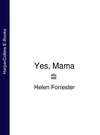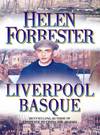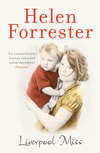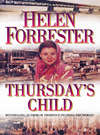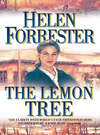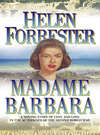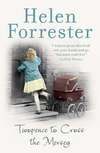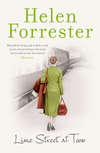Kitabı oku: «Yes, Mama», sayfa 2
‘There.’ She turned in her chair and handed the note to Polly. With a bit of luck, that would give the odious Woodmans a fair amount of trouble.
‘Oh, thank you, Ma’am.’ Polly’s voice was full of genuine gratitude as she made a deep curtsey.
Mrs Stanley gave a stiff nod of acknowledgement, and then ordered, ‘Put the desk back on to the far table.’
‘Yes, ’m.’ Polly did as she was bidden, being particularly careful not to spill the red and black inks from their crystal containers. She then backed to the door, bobbing little curtsies as she went.
‘James will show you out. Pull the bell by the fireplace.’
The only thing by the fireplace which could be pulled was a long piece of embroidered canvas hanging from the ceiling. Polly hoped for the best and pulled it. Then she stood with hands neatly clasped in front of her and examined the pattern on the carpet. She was stupid, she told herself. She should have realized that she would have to be escorted out of the house in case she stole something. Not that I would, she told herself crossly.
The old manservant arrived with commendable promptness. ‘Yes, Ma’am?’
‘Show this woman out – by the servants’ entrance.’
‘Yes, Ma’am. Of course, Ma’am.’ He twisted his toothless mouth into a tight knot. As if he would ever show a member of the lower classes out of the front door. After fifty years of service, Madam ought to know that, he thought irritably.
II
Sent upstairs by Rosie, Polly stood with head meekly bowed and examined the blue and white Chinese carpet in Elizabeth. Woodman’s room, while her new mistress looked her over for a second time.
The young woman seemed healthy enough; and with a reference from the high-and-mighty Mrs Stanley and a personal recommendation from her cook-housekeeper, Mrs Tibbs, she should be satisfactory. Yet, Elizabeth smelled a rat. Mrs Stanley was notorious for her perverted sense of humour. A leftover from the wilder days of King George IV and King William IV, the old devil was capable of all kinds of japes and capers.
As she peered in the candlelight at the humbly bent head, a much sharper pain shot through her and she cried out. Mrs Macdonald came to the bedside immediately. She picked up the rolling-pin from the bedside table and handed it to the sufferer. ‘There, there, Ma’am. Hold on to this.’
Elizabeth clutched at the pin and gritted her teeth, as she waited for the next pang. She felt tired already, worn out from worrying over the coming child’s existence. She was petrified at the thought of the outburst which might occur from Humphrey when he actually saw the baby.
But if she employed this Polly Ford, the child could stay in the old nurseries on the top floor for months, and as far as Humphrey was concerned, out of sight might be out of mind. And she herself would be freed from the boredom of feeding the baby. She could go out and fulfil her social obligations, be free to spend afternoons with darling Andrew, as before, though they would have to be much more careful.
She let another spasm go over, managing not to cry out. Then she said to the midwife, ‘Mrs Macdonald, tell Mrs Tibbs to see that this woman is bathed, her head rubbed with paraffin, and her present clothing wrapped up tightly and sent to her home. Mrs Tibbs should have her uniform ready by now.’
‘Yes, Ma’am. I’ll ring for Rosie.’
Polly kept her head down. This was much better than she had expected. Both she and her mother had been worried about getting her a uniform, fearing that the pedlar might not give them credit. Now the clothes were to be given to her. If she had dared, she would have sighed with relief.
Elizabeth knew from sad experience that vermin could come into a house in a servant’s trunk. She took no chances and always provided uniforms.
Polly endured without comment the humiliating complaints of her fellow servants, as a tin bath was lugged up to the windowless box room which would be her bedroom. Loquacious Fanny hauled two ewers of hot water and one of cold up the endless stairs from the basement kitchen, together with a bottle of paraffin, a bar of laundry soap, a piece of flannel and a worn bath towel. ‘Mind you don’t make no splashes,’ she warned Polly.
Polly had never had a bath in her life; she had simply rubbed herself cursorily with a bit of cloth wrung out in cold water. Now, Fanny laid an old copy of The Times on the floor and said, ‘Take off all yer clothes and put ’em on this. Mrs Tibbs’ll get next door’s gardener’s boy to walk down with ’em to yer ma’s.’
Polly looked at the girl appalled. Take off everything?
As if she could read her mind, Fanny said, with a grin, ‘Everythin’, ’cept yer stockin’s and boots – you’re to keep them.’
‘Well, you go away, Miss, while I does it,’ snapped Polly defiantly. Even Patrick had never seen her completely naked.
At the thought of Patrick, tears welled. Fanny saw them, and said sympathetically, ‘Don’t take on so. They did this to me when I coom. Fussy, the Mistress is – wash all of you every day, she allus says.’ She glanced up again at Polly, still standing uncertainly by the bath. ‘These days, I fancy a bath meself now and then – takes the aches out of yez. I’ll bet she’ll make you scrub your dairies every day.’ She nodded her head like a disapproving old woman. ‘Proper finick, she is.’
While she waited for Fanny to leave the room, Polly sat down and unlaced her boots. One of the bootlaces broke and she looked at it ruefully, wondering where she would get a halfpenny from to buy a new one. ‘What’s the Master like?’ she inquired carefully – her mother had warned her long ago, when she had been a ten-year-old tweenie in a big house, to keep out of the way of the men of the house.
‘Himself? Och, you don’t have to worry about him. He’s got a fancy woman downtown. Maisie – she’s the parlour-maid – says the woman keeps ’im exhausted!’ Fanny chortled and looked wickedly at Polly. Then she said more soberly, ‘They do say as once he got a maid in trouble and the Mistress sent her packing. Nowadays, he don’t even notice you’re there, though. He’s got a lousy temper, though. Just keep out of his way of an evening when he’s drunk.’
Polly digested this advice, and then, as Fanny picked up her empty ewer and moved towards the door, she asked, ‘What part of town do you come from?’
Fanny laughed. ‘I dunno, for sure. I got an auntie wot lives in Shaw’s Alley, but I coom ’ere from the Workie. I were born in there – and bloody glad I was to get out of it. At least the Mistress don’t beat you. It were me auntie that got on to you.’
‘Is your Mam still in the Workhouse?’
‘Not her. She died when I was only an itty-bitty kid. The Workie Gaffer hit her one day for something she said – and she lay down and I remember she were cold.’
Polly did not bother to ask her where her father was. In her experience, fathers often remained unknown. She sighed and said, ‘It must’ve bin proper hard for yez.’
Fanny’s eyes twinkled. ‘I wouldn’t give a dead farthin’ to go through it again,’ she replied forcefully. Swinging her empty ewer, she turned and plodded down the stairs to the basement.
Polly quickly stripped off her blouse, skirt and stockings. She put a cautious toe into the steaming water and then stepped into it. It felt comfortable, so she carefully lowered herself into it and reached for the soap lying on the floor. She took the hairpins out of her plaits and loosened her hair. She found that holding the hot flannel to her breasts eased the ache in them and she was able to expel some of her milk. It would be a day or two, she realized, before the baby would be able to suck, and, in the meantime, she must keep the milk coming.
After she had dried herself, she kneeled down by the bath and uncorked the bottle of paraffin. Holding her breath because of its smell, she rubbed it liberally into her damp hair, until it dripped into the bath. Then, using a fine-toothed comb which her husband, Patrick, had given her as a present, she combed the long, damp locks until she reckoned she had all the lice out; the paraffin would kill the nits, so, if she were lucky, she would be free of them.
Two full-skirted, ankle-length, cotton dresses with petticoats to go under them had been provided. In Polly’s eyes, the dresses were beautiful, far nicer than anything she had ever worn before; they had narrow, blue and white stripes. There were three large white aprons to wear over them and three white cotton bonnets to pin over her hair. To go out-of-doors, there was a navy-blue jacket, and a navy coif to go over the white caps.
She would have to find stockings and shoes for herself, and she wondered if her mother could prevail on the pedlar to let her have them on two months’ credit. Her first month’s wages would be appropriated by Mrs Tibbs, the cook-housekeeper, as her fee for getting her the job. As she thought about this, she replaited her hair and wound it into a neat bun at the back of her head.
When Fanny came back up the stairs, carrying a pair of slop pails in which to remove the bath water, she gaped at the newly created Nanny. ‘Well, I never,’ she exclaimed. ‘You look proper pretty.’
Her spirits revived, Polly gave the girl a playful cuff about the head for her impudence. Then she asked, ‘Wot time is servants’ meals?’
‘Breakfast at six-thirty, dinner ’alf-past eleven, tea at five. If Ma Tibbs is in a good mood, you get a bit o’ somethin’ afore bedtime – depends on wot’s left from the Master’s dinner. The Mistress isn’t mean, but Ma Tibbs is. She takes food to her sister’s house.’
‘I’m awfully hungry,’ admitted Polly, her voice trembling slightly.
‘Oh, aye. You could get a mug o’ milk or ale anytime you want – and I suppose I’ll ’ave to bring it up.’
She plunged her slop pail into the scummy bath water.
‘Bring me some milk and a piece of bread now,’ wheedled Polly. ‘There’s a pet. I’m clemmed.’
Fanny glanced up at her. ‘And the baby not even born yet?’ she teased.
‘Come on, Fanny. I’ll share it with yez.’
‘Well, seein’ as I know yez, I’ll ask for it.’
Chapter Three
I
At half-past eleven that warm May night, Alicia Beatrix Mary yelled her first impatient complaint in this world.
Dr Willis declared her a healthy child and Mrs Macdonald gave her her first bath. To ensure a flat, well-healed navel, a flannel binder was wound tightly round her stomach.
On a dresser lay a pile of baby clothes originally prepared for a brother, who, eight years before, had died within a month of his birth. Mrs Macdonald picked up a cotton napkin and one of terry towelling and enclosed Alicia in these. Then the child’s tiny arms were pushed into a flannel vest. A long cotton petticoat followed and then a flannel one, each tied at the front. Over all this went a fine white baby gown, frilled and embroidered and hemstitched in an Islington sweat shop. The long petticoats and gown were folded up over the protesting little feet, and she was finally wrapped in a warm, white shawl crocheted for her by her mother’s spinster friend and lifelong confidante, Miss Sarah Webb.
Almost smothered by the amount of clothing, Alicia carried her complaints to Humphrey Woodman.
Humphrey had been called from his booklined study by Dr Willis to inspect the new addition to his household and was uncertain, at first, whether he should go up. He had been startled when Maisie, the parlour-maid, had told him that his wife had commenced her labour. He had hoped to the last that his wife would miscarry, so that he would not have to face directly the fact of her infidelity.
Maisie was waiting, politely holding the door open for him, so he slowly pushed himself away from his desk and got up. As he straightened his velvet smoking jacket and gravely marched upstairs, a slow anger burned in him. He did not care a damn what Elizabeth did as long as she was discreet; but having a child at the age of forty was, alone, enough to interest the gossips and raise speculation.
Since Dr Willis and Mrs Macdonald were present, he kissed his wife dutifully upon her white cheek, and, afterwards, went to inspect the minute bundle lying in the frilly, draped cot which had served all his children.
His breath began to come fast as he gazed at the crumpled red face, and he seethed inwardly; at that moment he would have liked to murder Elizabeth and her lawyer, Andrew Crossing, whom he was fairly sure was the child’s father. Yet, in a sense, he also felt defeated. There was no question of his divorcing his wife; he must maintain his carefully built-up image of a well-respected city businessman with an impeccable home-life. To maintain society’s rigid proprieties, he would have to accept the baby as his. He knew it and he guessed that his wife was counting upon it – the sanctimonious bitch!
At the back of his mind, too, was the need to protect the future of his daughter, Florence, who was standing by him, bending over the little cot and tenderly touching her newborn sister with a careful finger. Florence was herself seven months pregnant. She was the wife of the Reverend Clarence Browning, a gentleman with small private means bent on a career in the church. A divorce between her parents, or even a separation, might put an end to his hopes of obtaining a bishopric one day.
Humphrey loved Florence. She was the only person to whom he showed any real affection. Her marriage portion had been as handsome as he could make it. Though at this moment he itched to beat her mother to death, he knew he would never make a single move that might injure his little Flo. When Alicia’s time came, however, he thought savagely, she would not get a penny out of him.
’isn’t she lovely, Papa?’ cooed Florence.
Humphrey continued to gaze expressionlessly at the crabbed little face, as he said politely, ‘Yes, my dear.’
While Dr Willis went to use the Woodmans’ magnificent new water closet, Mrs Macdonald stood, hands folded over her apron, at the foot of the bed, waiting for the series of visitors to pass. She would stay to nurse Elizabeth for a couple of days, before handing her over to her friend, Sarah Webb, to be cared for during the rest of her ten days’ lying-in.
As Humphrey turned to leave the room, he felt suddenly drained. His anger began to subside and he thought longingly of his Mrs Jakes. Most of his friends had a little woman tucked away somewhere in the town, and Mrs Jakes was his woman. Her well-patronized sweets and tobacco shop, on the corner of one of the crowded streets behind his office in Water Street, offered a fine excuse for visiting her. His need for tobacco for his pipe and the occasional gift of sweets for his children accounted easily for his going there. When the shop was empty of customers, he would slip behind the counter and through the door to her living-quarters. She would send her dull, thick-waisted daughter to tend the shop, lock the intervening door and draw the lace curtains over the window in it. They could be very cosy together behind the lace-draped door, sitting in front of her blazing coal fire; or they could go up the stairs which led to her bedroom above. It was a discreet, mutually agreeable arrangement. Why could not Elizabeth have been equally circumspect? he fumed.
Now, ignoring his wife, he said goodnight to Mrs Macdonald and told Florence to go to bed soon. Mrs Macdonald, much experienced in these matters, drew her own conclusions.
Downstairs, Humphrey waited in his study until the doctor should be shown in. Dr Willis, when he did come, accepted a glass of port and lifted it in a toast to the newborn. Humphrey bent his head slightly in acknowledgement, but he did not raise his glass. As Dr Willis drank from his glass, his eyebrows rose slightly – so his own wife’s gossip about Elizabeth Woodman had a sound basis. Woodman was showing none of the jovial relief at a safe delivery that most men exhibited. He hastily finished his wine, put down his glass and said that he would call again the following morning, to check both mother and child.
II
Upstairs, Mrs Macdonald was deferentially solicitous and wondered privately who would pay her bill. She said, as she fussed round her patient, ‘Miss Webb wondered if you would like a bite to eat, Ma’am?’
Sarah Webb, being a spinster, would not visit her friend until the morning; not having been married, she was supposed, officially, not to know how babies arrived. The following day seemed to her to be a polite time to come up. She had, meanwhile, taken over the housekeeping, and Mrs Tibbs had had a long, uncomfortable evening as Sarah began to cope with a kitchen unused to being visited by its mistress.
Florence reinforced the suggestion of food. She said, ‘Yes, Mama, you should take something to eat. You have to keep up your strength.’ Florence was deadly tired, her bundly body aching in every direction, but she spoke brightly to her mother.
‘Very well, dear,’ Elizabeth responded wearily. ‘Tell Mrs Tibbs to make me a plain omelette and toast – and some Madeira to drink.’
Mrs Macdonald pulled at the bell rope.
Elizabeth continued to talk to her daughter. ‘I have a wet-nurse for the child,’ she told her with a wan smile. ‘I don’t propose to feed her myself. At my age …’
Florence nodded understandingly. She had not been informed of her mother’s pregnancy until a week before the birth. Elizabeth had not felt able to tell a pregnant daughter that she was expecting an infant. At forty, it was indecent to be in such a situation; she herself had not expected it to happen.
As her mother’s figure burgeoned under the flounces and heavy drapery of her elaborate dresses, the situation had been clear to Florence for some time. She was, however, much too well brought up to mention the subject until her mother cared to bring the matter up and she expressed suitable surprise when Elizabeth suddenly blurted out that she would be brought to bed within the month. She had been much alarmed that her mother would not survive and had prayed earnestly each night that she be safely delivered. Now, she thought, she must pray for herself.
As if the midwife divined her thoughts, she turned towards her and smiled faintly, ‘You look very well, if I may say so, Ma’am. You’ll soon know the joy of your own wee babe in your arms.’ There was oily comfort in every word.
‘Thank you, Mrs Macdonald,’ responded Florence graciously, ‘With your help, I’m sure I will.’
In answer to the bell, Maisie, the elderly parlour-maid, arrived and was instructed regarding a meal.
‘Tell Mrs Ford she may now come to remove the baby,’ Elizabeth told the maid. ‘I trust a fire has been made in the nursery – and in baby’s bedroom?’
‘Oh, yes, Ma’am. Fanny’s bin watching both fires ever since atternoon.’
Up in the nursery, Polly, lulled by the heat, had gone to sleep in an old easy chair set by the fireplace. In the glow of the coals, she looked softly pretty, tidier, more clean than she had ever been in her life.
When Fanny clumped in with yet another hod of coal, she woke up with a start.
‘Coom on, now,’ Fanny commanded her. ‘The Missus wants you to take the baby.’ She dumped the heavy coal hod into the fireplace, picked up a pair of tongs and lifted a couple of lumps of coal on to the blaze. ‘Maisie and Rosie’ll bring the cot up.’ She yawned enormously, her stunted little body stretching as she did so. ‘Aye, I’m that tired. Seems to me as if none of us is goin’ to get to bed tonight. And I got to be up at five, ’cos ould Tibbs raises Cain if she don’t have a hot oven by six o’clock, ready to put the bread in.’
Polly got up and stretched. Then she peeked into the mirror over the dresser, to check that her hair was still neat and her cap on straight. ‘Fancy having a mirror,’ she thought to herself gleefully. She picked up the candle from the table.
‘Aye, don’t leave me in the dark,’ protested Fanny. She hastily tipped the rest of the coal into a brass coal scuttle at the side of the hearth. ‘It’s proper ghosty up here, what with Mr Charles and Mr Edward gone away and not usin’ the rooms on the other side o’ the passage.’
Polly waited for the little skivvy and then, carrying the candle, led her down the dark staircase, the coal hod clanking like chains behind her.
On the floor below lay Elizabeth’s bedroom and beside it the dressing-room in which Humphrey had slept for the last year or so. Also on this floor, lay Florence’s old bedroom, a guest room and the main drawing-room; the latter was shrouded in dust sheets, because Elizabeth could not entertain in the last months of her pregnancy; it was not the thing. At the back of the house, on this same floor, was Elizabeth Woodman’s latest status symbol, a brand new water closet and a handsome adjoining bathroom with hot and cold water which belched from shining brass taps.
‘You’re not allowed to use the water closet,’ Fanny warned Polly, as they passed it. ‘You got to come down to the closet outside the back kitchen door – or you can use a chamber-pot and empty it yourself down there. I ’aven’t got no time to be running up and down with a slop pail to clear it for yez. There’s an old slop pail in the nursery cupboard if you want to use it.’
Polly reached Elizabeth’s door at the same time as Maisie was about to enter, so she followed her in. They both stood just inside the doorway, hands folded, eyes down, waiting for orders.
Elizabeth was sitting up in bed, wrapped in a pink shawl, her hair plaited neatly over each shoulder. She was feeling better and, though her eyes were black-ringed, some of her normal high colour had returned to her cheeks; the birth had, in fact, been quite an easy one. She fully expected that, thanks to Mrs Macdonald’s modern ideas of well-scrubbed hands, boiled aprons and sheets, she would be spared that plague of new mothers, childbed fever.
Replete with omelette and half a bottle of Madeira, her breasts bound tightly by Mrs Macdonald to prevent the flow of milk, all she wanted now was that the child be taken away, so that, as much as possible, she could forget it. She hoped, also, when trouble with her husband had blown over, that she could be reunited with Andrew Crossing, only in a more private place than on her drawing-room settee.
‘Polly,’ she snapped at the trim, black-haired wet-nurse. ‘Take the baby upstairs. See that it is fed every three or four hours and has its napkin changed frequently to keep it dry.’ She turned to Maisie. ‘Take the tray away. That will be all for tonight.’
‘Thank you, ma’am,’ Maisie replied, took the tray and fled thankfully to her bed. Polly approached the cradle cautiously and picked up the tiny bundle which was Alicia Beatrix Mary. The infant opened its eyes and whimpered.
‘Polly.’
‘Yes, ’m?’
There is a good supply of clothing in the chest of drawers in the nursery. Fanny will remove any washing including your own. She will also bring up your meals. The washerwoman will come twice a week. See that the dirty clothes and sheets are down in the wash cellar by six o’clock every Monday and Thursday morning.’
Polly bobbed a small curtsey to indicate agreement.
‘I have instructed Mrs Tibbs to feed you well and let you have as much milk as you can drink.’
Having met Mrs Tibbs, Polly did not have any great hope of these instructions being followed properly. She whispered, however, a faint ‘Thank you, ma’am.’ She allowed herself a small shivering sigh – it had been a long and eventful day for her – and then asked, ‘What’s baby’s name, ma’am?’
‘Alicia Beatrix Mary,’ replied Elizabeth, having decided that it was better to name the child herself, rather than ask Humphrey his opinion. Though she would not have liked to admit it, there was the thought in the back of her mind that, like its baby brother, it might die within the month, anyway; and that would solve a lot of her problems.
Andrew had assured her that since she and Humphrey lived together the child was legally his, unless he repudiated it. Nevertheless, she supposed she would have to go herself to register its birth, as soon as she felt well enough; Humphrey was hardly likely to do anything about putting his name on the birth certificate. She must also write a note to Andrew, she reminded herself, telling him of Alicia’s birth; she could say that she wanted to alter her Will slightly to include a small legacy to the new baby. She sighed, and hoped he would come soon.
‘You may go,’ she told Polly, patiently standing in front of her with the baby in her arms.
Ücretsiz ön izlemeyi tamamladınız.
